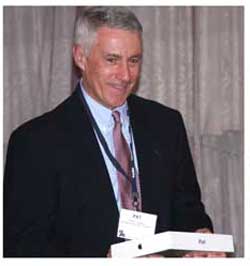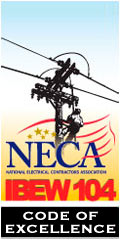
| Past Issues/Subscribe | Employment | neppa.org | Legislative Update | Advertise | February 2015 |

Historic Interview: Pat Hyland
In honor of our 50th Anniversary, we continue to feature significant figures from our past. This month we spent time with Pat Hyland, who served as Executive Director from 1989 until 2011. Pat has dedicated his life to service and is credited with creating the Public Utility Management Program. Here are a few excerpts from the exchange.
In terms of value, what service do you think has had the most impact?
In my view, NEPPA’s most valuable program has always been the provision of professional training and educational programs for its members. Early on, basic lineworker safety and skills classes were critical to many systems in the region. They also needed to have these classes conducted within or near their service territories, so that lineworkers could be available in the event of emergencies. NEPPA was uniquely able to fill these needs, and its lineworker programs are now recognized as among the best in the industry. Over time, and with the guidance and support of the Training Committee, NEPPA has expanded its training programs to all aspects of utility operations, including leadership and management skills, customer service, engineering, accounting and finance. I am pleased to see, as well, that the number and variety of training programs continues to increase, and that NEPPA will soon be offering continuing education units to participants.
What do you see as NEPPA’s primary role in the future?
I anticipate that NEPPA will continue to meet the expanding training needs of all its member systems, utilizing digital technologies to deliver programs in a variety of ways. I also expect that NEPPA’s mutual aid program will continue to grow in importance to member systems, as major weather events appear to be increasing in our region, and the need for timely assistance from other systems will likewise probably increase.
Should NEPPA play a major or minor role in Washington?
I believe that Washington representation is an important role for a regional association such as NEPPA. Unlike some other regions, New England has significant Congressional clout, with 12 Senators and 21 Members of the House. Until recent years, we have enjoyed the benefits of Congressional seniority among many of our members, which translates into real influence in Committee membership and bill sponsorship.
It is worth remembering that before the mid-90s, NEPPA did not have a formal legislative representation program. Some members did not want part of their membership dues to be spent on lobbying in DC. Through the efforts of several members of the Legislative Committee, most notably Sharon Staz and Alan Yandow, we were able to convince most members that a Washington presence for NEPPA was important, and that the costs should be funded through membership dues.
How do today’s challenges compare to those of previous periods?
Some of today’s challenges to public power remain the same as they were 50 years ago:
The evolution of digital technology and industry deregulation have posed many new challenges for public power. These include, among many others, distributed generation, self-generation by customers, smart grid investments and cyber security. While every generation of public power officials has faced difficult challenges in serving their customers and "keeping the lights on," it does seem that these have gotten more complex as the industry has evolved.
What has been the biggest change in the industry over the past 50 years?
I believe that one of the most transformative changes in the electric utility industry over the past half-century has been the deregulation of wholesale power generation and the creation of regional power supply markets governed by ISOs and other regional entities.
These markets have fundamentally changed the way that electric utilities do their business, and have imposed significant costs and administrative burdens, especially on smaller public power systems. The New England region was one of the first to deregulate retail electric markets in the 1990s, and the simultaneous development of deregulated wholesale markets in our region has really complicated the business of power supply planning and purchasing. In theory, these changes were supposed to lead to lower prices and other customer benefits; the jury is still out on this, at least in New England.
If I used the word "visionary," what NEPPA member comes to mind?
With 50 years of history, NEPPA has certainly benefited from the visions and hard work of many people. In thinking about this question, however, I think the most credit must be given to the association’s founders, who saw the need for a regional public power association in New England, and then did the hard work to make it happen. This hard work included convincing a lot of stubborn, independent-minded municipal light department officials scattered over six different states that more could be accomplished as a group than as a collection of individuals. Those of us who grew up and live in New England can appreciate what a real accomplishment this was. And their "vision" lives on, 50 years later.
Thank you Pat! We hope you can join us at the Annual Conference, where our 50th celebration festivities will kick in to high gear.
Have a suggestion for a significant figure from the past 50 years? Let us know by emailing ccrouse@neppa.org.
 |





